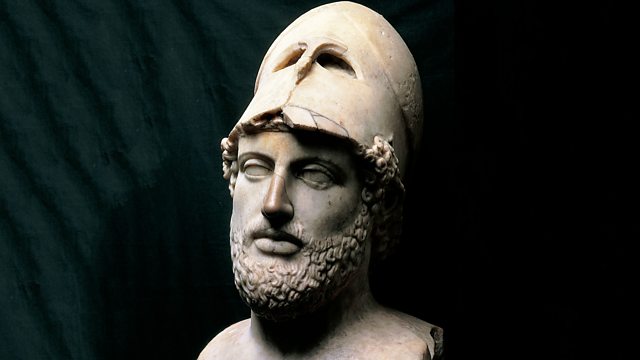Translation of Pericles’ Funeral Oration via the University of Minnesota: http://hrlibrary.umn.edu/education/thucydides.html
Personally, what I found hardest about this reading was understanding the vocabulary and grammar structures used. Because the reading is a translation of a funeral oration given thousands of years ago, translating the speech into an easily accessible format for today’s readers is difficult because of the language’s grandiose nature. It took me many readings going through each sentence individually to translate each into a way that I understand, and after doing this I could reread the speech in English I more easily could understand.
(I suspect this must be a part of the reason why people who study philosophy and political science are always buried in readings. Aside from the vast amount they have to read, they also have to spend a while with each text…

Although I understand the merit of reading from the ‘source’ text of Thucydides’ speech, it also makes me wonder that perhaps these sorts of dense literature should be translated into an easier-to-understand nature to make them more accessible to anyone interested in reading them. Currently, it reminds me of the age-old argument that the visual arts industry is too high-brow. Perhaps it would be beneficial to forfeit the ‘culture’ of the discipline viewed by the public’s eyes in favour of accessibility for non-niche works? However, perhaps I am too unaware of the nature of the philosophy and political science fields to have a proper opinion about this particular.
With regards to the oration itself, it seems to me that Pericles in his 430 BCE funeral oration praises Athens’ public funeral customs while also, interestingly, criticising the inclusion of a funeral speech in the customs. He says that a speaker cannot be expected to satisfy the deceased’s loved ones because they would want a grand retelling of the deceased’s deeds, but then states that doing this might make others feel jealous of thinking that the speaker is exaggerating.
Pericles then moves on to the main argument of his speech – that Athens is great and democracy should be fought for. He praises the city of Athens and he does this to praise the war effort of Athens’ citizens by glorifying the city of Athens. Pericles in his speech focuses on Athens’ political ideologies and how this makes Athens great.
He uses examples of Athens’ migration policy and equality beliefs to tell the audience that happiness means ‘to be free.’ Pericles summarises that you must fight for freedom, and therefore his audience should engage with the war effort such as their deceased loved ones.
I think that the speech is persuasive because Pericles initially discusses the war heroes, and Athens’s greatness, and then addresses his audience after setting the stage for a glorified and equal nation. Pericles then praises Athens’ military and urges the citizens to support the war because they are fighting for important things such as happiness and freedom. He’s pretty much hitting up the ethos-pathos-logo trifecta.

He uses the example of the deceased who gave their lives for the war – an emotional ink – to protect Athens, its citizens, and their freedom to persuade the audience. Pericles then praises Athens for democracy and how he believes that it shows trust in its citizens and provides freedom – comparing the policies of their war enemy to persuade them into the belief that Athens is great and the war against a worse nation is good.
He calls the deceased men of merit and says that fighting and dying for one’s country is a great honour. He furthers this point by saying that any bad traits you may have been outweighed by being a good citizen. Pericles encourages national pride by telling his audience to set aside their desires for a greater cause like their loved ones who are deceased because Athens is an equal, open-minded, and smart nation and therefore its people also have these traits. Therefore, he says that the greatest honour a citizen could have is to die for the freedom of Athens for democracy…

Wow, this was very interesting! I totally agree that some of the really old text should probably have at least a few translations into more modern English so more people that aren’t experts in the field could enjoy them. I think it’s interesting that this funeral speech’s content is so similar to speeches that might be given today at a soldier’s funeral with slogans like “Freedom isn’t free” and the like.
LikeLiked by 2 people
Agreed! The “freedom isn’t free” slogan is definitely true… And I wonder if these older texts were more readily available, and if more importance in education was placed upon liberal arts, if there would be less people in charge of governmental bodies that just push their own viewpoints that they grew up with and never thought to challenge?
Because aside from the obvious sadness this brings, it also makes it difficult for young people to want to get into politics, law and policy advocacy when it’s so mentally exhausting and you only can pick one niche area to focus upon because it takes so much time, resources, and effort to just try to improve one small thing when you’re aware of all the small and large issues
LikeLiked by 1 person